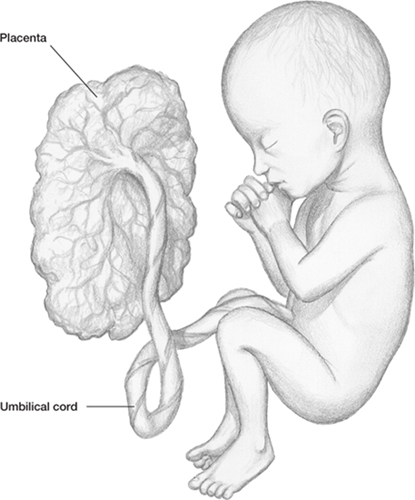4. How Your Actions Affect Your Baby’s Development
Asthma in Pregnancy
Asthma is a chronic respiratory
disease that causes small airways in the lungs to narrow. It is
characterized by attacks of labored breathing, wheezing, shortness of
breath, chest constriction and coughing. People with asthma often have
symptoms followed by symptom-free periods. The most common causes of
asthma include allergens, exercise, strong odors and cold air.
The problem affects about 2% of the
population in the United States and Canada. It is equally common in
other countries. Asthma may occur at any age, but about 50% of all
asthma cases occur before age 10. Another 33% of the cases occur by age
40. About 70% of people with asthma also suffer from allergies.
Summertime can cause asthma problems when
air quality is poor. Smog can cause inflammation in the airways,
coughing, wheezing and shortness of breath.
Sufferers should be
careful during storm season—thunderstorms may increase the risk of an
asthma attack. Research shows rain and lightning break pollen into
extremely small particles, which can be more easily spread by a storm’s
winds.
Many asthma sufferers have heartburn;
heartburn may cause asthma symptoms to worsen. Upper-respiratory
infections caused by the flu may also trigger an attack.
Pregnancy’s Affect on Asthma.
About 8% of all pregnant women have asthma. It’s 40% more common in
women than in men and is one of the most common medical problems
pregnant women face.
If you have asthma and are overweight when you get pregnant, your baby is more likely to have asthma.
Some pregnant women appear to get better
during pregnancy, while others remain about the same. However, if you
have severe asthma attacks when you aren’t pregnant, you may also have
severe attacks during pregnancy.
Studies show if your asthma is under
control throughout pregnancy, your pregnancy outcome can be as positive
as a woman who doesn’t have asthma. Controlling your asthma may help
lower your risk of developing some pregnancy problems. We also know
asthma symptoms often improve during the last month of pregnancy due to
hormonal changes.
Untreated asthma can put you and baby at
risk. If you have severe, uncontrolled asthma, baby may be deprived of
oxygen during your asthma attacks. If you’re not getting enough air,
neither is baby.
It’s important to have a flu shot to
reduce the risk of getting severe respiratory illness, which could make
asthma attacks worse. Avoid cigarette smoke. Don’t smoke, and keep away
from others who smoke.
If your baby is a girl, research shows
asthma attacks might worsen during pregnancy. If your baby is a boy,
attacks might be better because the androgens (male sex hormones)
produced by male fetuses are believed to have a protective effect on
moms-to-be with asthma.

The placenta, shown here with the fetus, carries oxygen and nutrients to the growing baby. It is an important part of pregnancy.
See your allergist
regularly during pregnancy for a lung-function test. This helps
determine whether your medication dosage needs to be adjusted. Your
allergist may also suggest you monitor your breathing with a peak-flow meter to find out how open your airways are.
Asthma shouldn’t be a deterrent to learning breathing techniques used in labor. Talk to your healthcare provider about them.
Treating Asthma Attacks.
Asthma treatment is important so baby can get the oxygen it needs to
grow and to develop. During pregnancy, your oxygen consumption
increases by about 25%. The treatment plan used before pregnancy often
continues to be helpful.
Research shows it’s better for you to
take asthma medicine during pregnancy than to risk asthma attacks and
their complications. Most asthma medicine appears to be safe during
pregnancy; however, check with your healthcare provider before using
your usual prescription medication.
Asthma medication, such as terbutaline,
and steroids, such as hydrocortisone or methylprednisolone, can be used
during pregnancy. Aminophylline, theophyline, metaproterenol (Alupent)
and albuterol (Ventolin) are also safe to use.
In addition to any medicine you take for
asthma, there are a few other things you can do to help avoid attacks.
Using a dust-mite-proof cover on your mattress may lower your chances
of having an allergic asthma attack. One study showed eating citrus
fruit—more than 46g a day (⅓ of a medium orange)—may help reduce
chances of having an asthma attack. Eating spinach, tomatoes, carrots
and green leafy vegetables may also reduce risk. Fish oil has been
shown to improve breathing in exercise-induced asthma. Talk to your
healthcare provider about how much you should eat of any of these foods.
Studies show inhaled steroids do not seem
to affect baby’s growth. Inhalers work directly on the lungs, so very
little medicine enters your bloodstream. However, don’t use Primatene
Mist during pregnancy.
If your asthma is severe, you may be
given an anti-inflammatory nasal spray, such as cromolyn sodium
(Nasalcrom) or an inhaled steroid, such as beclomethasone (Vanceril). Discuss the situation at one of your early prenatal visits.